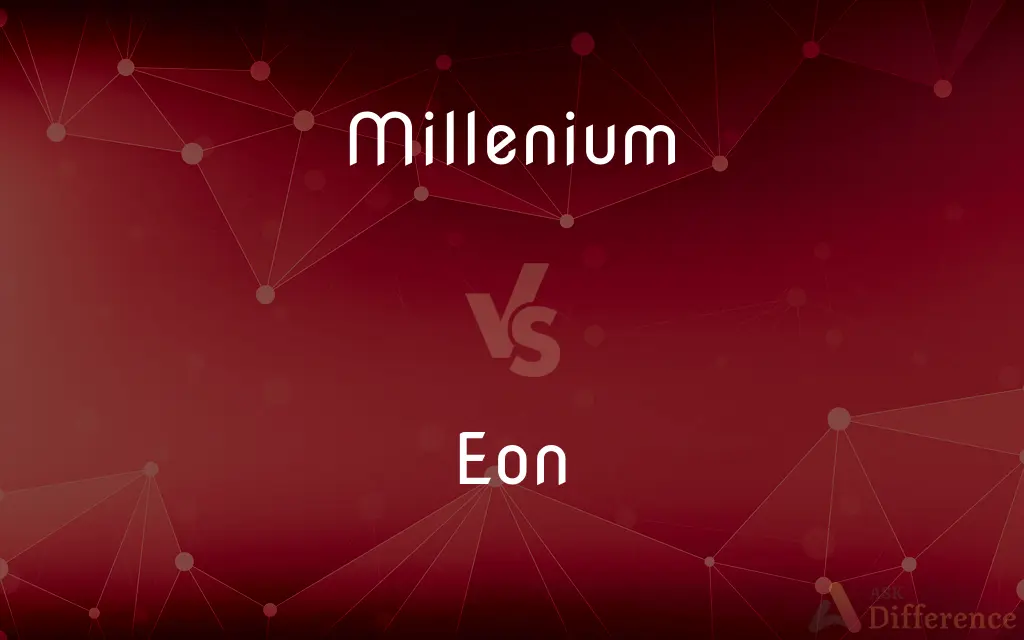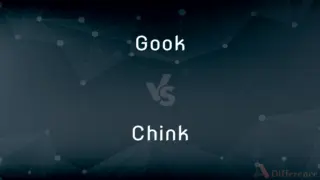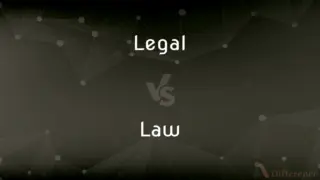Millenium vs. Eon — What's the Difference?
By Tayyaba Rehman & Fiza Rafique — Updated on April 2, 2024
A millennium spans 1,000 years, focusing on chronological length, while an eon represents the longest division of geological time, encompassing billions of years.

Difference Between Millenium and Eon
Table of Contents
ADVERTISEMENT
Key Differences
A millennium is a period of 1,000 years, often used in historical and future context predictions. It is a term widely used in discussing significant anniversaries or projections into the future. On the other hand, an eon is the largest unit of geological time, covering billions of years, and is used primarily in geology and astronomy to describe vast, almost incomprehensible spans of time.
Millenniums are used to segment history into more manageable intervals, allowing for the organization of historical events in a timeline that is relatable to human experience. Whereas eons divide the earth's history into major time periods that describe the formation and development of the Earth and life on it, reflecting changes on a planetary scale.
In cultural and societal terms, the concept of a millennium carries significant weight, often associated with major changes, celebrations, or apocalyptic predictions. Eons, however, are more abstract to the human mind due to their immense scale, primarily concerning scientists studying Earth's history and the universe.
While a millennium is a concept easily grasped and relevant to human civilization's timeframes, an eon represents durations that extend beyond human civilization, marking transitions in the Earth’s geology and biological evolution that are significant to the planet’s history.
Both terms serve as markers of time, but their scales and uses differ vastly. The millennium is tied closely to human history and future speculations, while an eon speaks to the vast, slow processes of natural history and the cosmos.
ADVERTISEMENT
Comparison Chart
Uration
1,000 years
Billions of years
Use
Historical and future context
Geological and astronomical time
Scale
Relatable to human experience
Beyond typical human comprehension
Significance
Cultural, societal, historical
Geological, biological, cosmological
Context Examples
Anniversaries, future projections
Earth's formation, major geological events
Compare with Definitions
Millenium
Used to mark significant historical periods.
The second millennium saw vast technological advancements.
Eon
The largest division of geological time.
The Precambrian eon covers the vast majority of Earth's history.
Millenium
A benchmark for major historical changes.
The fall of the Roman Empire marked the beginning of a new millennium.
Eon
Encompasses billions of years.
Life on Earth evolved over the course of several eons.
Millenium
A term in futurism for predicting long-term trends.
Futurists debate what the third millennium holds for humanity.
Eon
Used to describe the longest periods in the universe's history.
Galaxies formed in the early eons of the universe.
Millenium
A period of 1,000 years.
The monument stood the test of time, lasting a millennium.
Eon
Beyond human civilization's timeline.
Eons transcend the brief period of human history.
Millenium
Associated with significant celebrations.
The new millennium was welcomed with worldwide celebrations.
Eon
Reflects significant changes in Earth's geology and life.
The Phanerozoic eon saw the rise and diversification of life on Earth.
Millenium
Archaic spelling of millennium
Eon
An indefinitely long period of time; an age.
Millenium
Misspelling of millennium
Eon
The longest division of geologic time, containing two or more eras.
Eon
(US) Eternity.
Eon
A period of 1,000,000,000 years.
Eon
(geology) The longest geochronologic unit, being a period of hundreds of millions of years; subdivided into eras.
Eon
A long period of time.
It's been eons since we last saw each other.
Eon
A spirit being emanating from the Godhead.
Eon
An immeasurable or infinite space of time; eternity; a long space of time; an age.
The eons of geological time.
Eon
One of the embodiments of the divine attributes of the Eternal Being.
Among the higher Æons are Mind, Reason, Power, Truth, and Life.
Eon
The longest division of geological time
Eon
An immeasurably long period of time
Eon
(Gnosticism) a divine power or nature emanating from the Supreme Being and playing various roles in the operation of the universe
Common Curiosities
What is an eon?
An eon is the longest unit of geological time, encompassing billions of years, used in geology and astronomy.
Can an eon contain multiple millenniums?
Yes, an eon contains millions of millenniums, reflecting its much greater duration.
Why are millenniums significant to humans?
Millenniums are significant due to their relation to human history, culture, and future projections.
How do millenniums and eons differ in scale?
Millenniums are comprehensible to humans, spanning 1,000 years, while eons cover vast, almost incomprehensible spans of billions of years.
Are eons relevant to daily human life?
While not relevant on a daily basis, eons are crucial for understanding Earth's history and the universe's evolution.
How does the concept of an eon help in understanding the Earth's history?
It provides a framework for understanding the long-term processes and significant events in Earth's geological and biological evolution.
What is a millennium?
A millennium is a time period of 1,000 years, often used in historical contexts or future speculations.
Why might scientists use the term "eon"?
Scientists use it to describe and study the vast timescales of Earth's formation, geological changes, and the evolution of life.
What kind of changes does an eon reflect?
Eons reflect major geological, biological, and cosmological changes over billions of years.
Can a historical event be described using both terms?
Generally, historical events are described in terms of millenniums, while eons are used for geological and astronomical timelines.
What is an example of an event that would be marked by a millennium?
The transition from the 2nd to the 3rd millennium CE was marked by global celebrations and reflections on human progress.
How is the term "millennium" used in society?
It is used to denote significant historical periods, anniversaries, and predictions about the future.
What is the significance of the Precambrian eon?
The Precambrian eon represents the time before the Cambrian period, covering most of Earth's history and the development of life.
Is there a cultural significance to the start of a new millennium?
Yes, the start of a new millennium is often seen as a momentous occasion, marked by celebrations and reflections on the future.
How do millenniums help in studying history?
They allow historians to segment history into manageable intervals for better organization and understanding.
Share Your Discovery

Previous Comparison
Gook vs. Chink
Next Comparison
Legal vs. LawAuthor Spotlight
Written by
Tayyaba RehmanTayyaba Rehman is a distinguished writer, currently serving as a primary contributor to askdifference.com. As a researcher in semantics and etymology, Tayyaba's passion for the complexity of languages and their distinctions has found a perfect home on the platform. Tayyaba delves into the intricacies of language, distinguishing between commonly confused words and phrases, thereby providing clarity for readers worldwide.
Co-written by
Fiza RafiqueFiza Rafique is a skilled content writer at AskDifference.com, where she meticulously refines and enhances written pieces. Drawing from her vast editorial expertise, Fiza ensures clarity, accuracy, and precision in every article. Passionate about language, she continually seeks to elevate the quality of content for readers worldwide.
















































